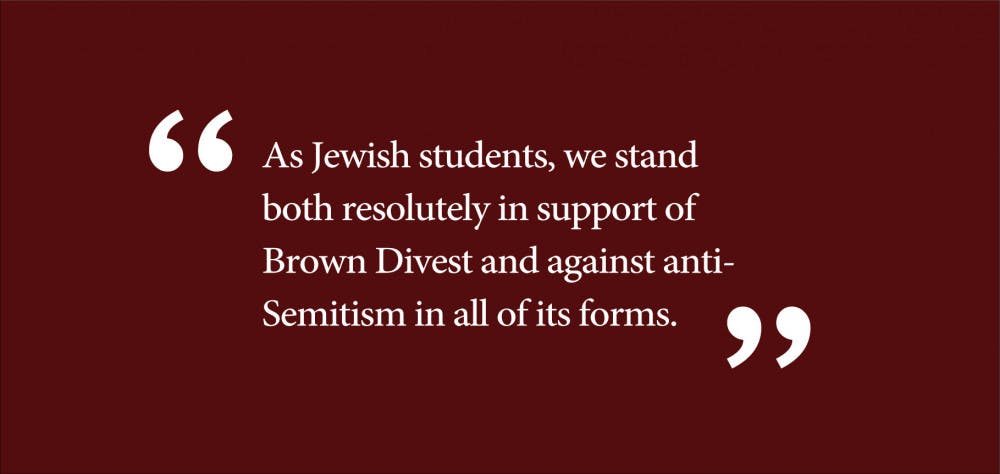As a group of Jewish students, we feel compelled to oppose injustice across the world in all of its forms, and we stand in solidarity with Palestinian people who are subject to human rights abuses. We draw inspiration for our activism from both our religious tradition and our political history, and we are proud members of the Brown Divest coalition.
While every member of the Brown Divest campaign has a unique and legitimate reason for advocacy on this issue, we feel particularly compelled to vocalize our opposition to Israeli violation of human rights as Jews in the United States. Our Jewish identity compels us to speak up for two primary reasons: Jewish religious and political history, and Israel’s claim to speak for all Jews.
Next month, we will celebrate Passover, commemorating the exodus from Mitzrayim and the bondage we experienced there. The Torah reads, “and you shall not oppress a stranger, for you know the feelings of the stranger, since you were strangers in the land of Mitzrayim” (Exodus 23:9). If we’re committed to the Torah’s call for tikkun olam (repairing the world), to ger toshav (treating strangers as neighbors) and to chesed (loving-kindness), these values must extend to Palestinians.
Jews throughout history have mobilized to stand in solidarity with other oppressed peoples. From the Jewish Labor Bund in 19th century Europe to Jewish students and clergy who participated in the Freedom Rides in the 1960s, progressive Jews have often seen their history of marginalization and oppression as reason to band together with other vulnerable groups, rather than isolate themselves or ally with state violence. While some argue that Israel’s aggression toward Palestinians is necessary in order to protect Jews both in the nation and elsewhere, we resist cynical, zero-sum calculations of Jewish safety that lead to isolation — and insist that we find the greatest safety in solidarity with oppressed people around the world.
We are also compelled to speak out against Israel because Israel claims to speak for us. On March 11, Prime Minister of Israel Benjamin Netanyahu stated that “Israel is the national state, not for all of its people, but for Jews alone.” It is this rhetoric that compels us, as Jews, to act. We refuse to be spoken for by a nation-state whose policies too often rest on dispossession, displacement and violence against Palestinian people.
While we are critical of the state of Israel and the policies his government pursues, we also implore all students to think deeply about how criticism of Israel can, and sometimes does, intersect with anti-Semitism. For example, claims that Israel’s oppressive policies are inherently tied to its Jewish character are anti-Semitic. However, calls for divestment and critiques of Israel and its policies are not inherently anti-Semitic. As Jewish students, we stand both resolutely in support of Brown Divest and against anti-Semitism in all of its forms. We believe that our opposition to human rights abuses and our abhorrence of religious persecution and bigotry can coexist.
Some students have opined that the Brown Divest campaign singles out Israel’s moral and legal transgressions, setting it apart from other states around the world. The claim that advocating for Palestinian rights implicitly condones human rights violations elsewhere distracts from the real conditions Palestinians face. Singling out one area of injustice does not mean endorsing all other human rights abuses. Further, Brown Divest has continuously highlighted that the named companies facilitate human rights abuses in Palestine and in other areas of the world.
With the Undergraduate Council of Students referendum, we are glad to see fellow students grappling with Brown’s investments, which reveal complicity in violence perpetrated against Palestinians. We are also disappointed by claims that this campaign has not fostered healthy dialogue. Far from shutting down dialogue, during the events that Brown Divest has sponsored this semester, we have participated in crucial conversations about some of the most pressing international issues of our time and our complicity in them. We are also excited by the earnestness with which Brown Divest members work to learn about anti-Semitism and how it operates, both through conversations with Jewish students during the organizing process and through attending Jewish Voice for Peace’s anti-Semitism workshop this semester. This process of learning and thinking through these issues together is far too important to shy away from. We implore other critical students to engage in this dialogue with us.
As Jews who support Brown Divest, we are excited about the conversation the referendum opens about whether we, as Brown students, support the 52-year-old Israeli occupation of the West Bank and the Gaza Strip, or whether we stand against it, and demand that Brown take action to end our complicity in it.
We hope you will join is voting #YesOnDivest.
Evan Lehmann ’19, Sam Frolichstein-Appel ’19, Noah Byck Mlyn ’20 and Brian Solomon ’19 can be reached at evan_lehmann@brown.edu, samuel_frolichstein-appel@brown.edu, noah_mlyn@brown.edu and brian_solomon@brown.edu. Please send responses to this opinion to letters@browndailyherald.com and other op-eds to opinions@browndailyherald.com.





